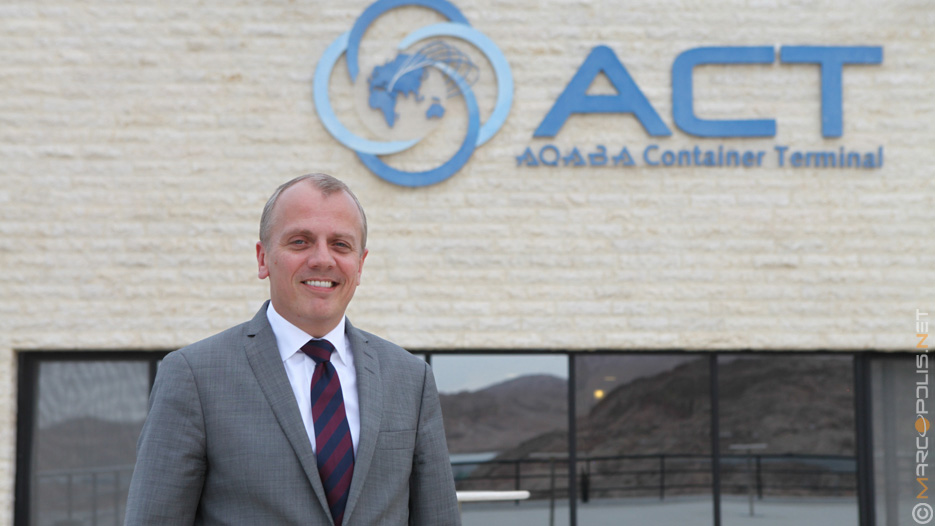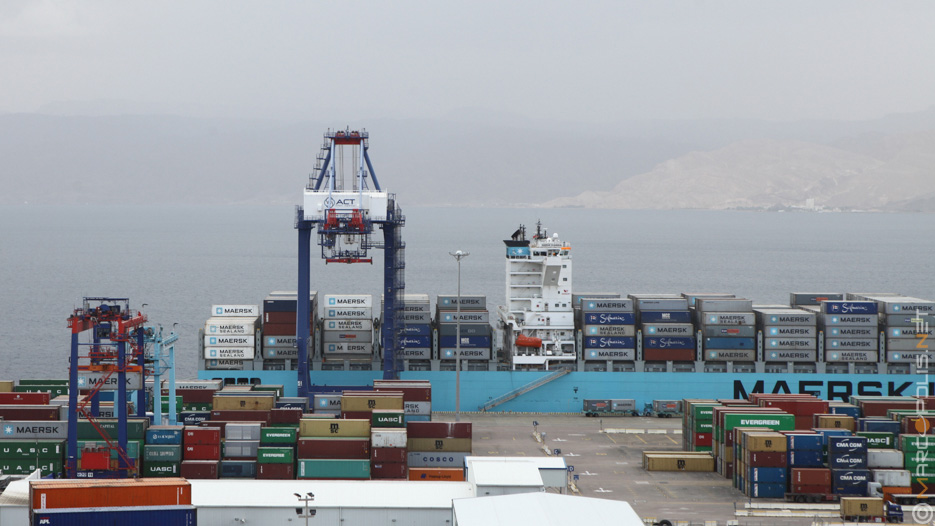Aqaba Container Terminal (ACT): Aqaba As the Top Cargo Gateway to the Levant
“We are very strategically placed to serve the Levant area in the region and are working tirelessly to develop the most efficient transportation system of the region, from Aqaba to Amman and beyond, towards the borders.”
Interview with Jeppe Nymann Jensen, CEO of Aqaba Container Terminal (ACT)

Give us your overall evaluation of the role of APM Terminals in Jordan and your main activities here.
APM Terminals has been in Jordan first in 2004 after winning a tender for a two-year management contract to address the terrible congestion that the port was suffering at that time. In 2006, APM Terminals entered a private public partnership and took over the concession of Aqaba Container Terminal (ACT). Throughout the years and with significant investments, we have seen a substantial improvement in the terminal operations, from a congested port with vessels waiting outside to berth for days to state-of-art operations. We actually increased the terminal productivity four fold since 2004. We invested in IT systems, in new handling equipment and we have expanded the terminal quay length to a full 1,000 meters. We have had a really good journey with our investment in Jordan thus far but there is still a lot to do to improve Jordan’s land side logistic infrastructure for Aqaba to remain the most sustainable cargo gateway to the Levant.
In 2012 we took over the majority share of Aqaba Logistics Village (ALV). Since then, together with our local partner, we have expanded its capacity and developed ALV into an efficient logistic complex. Besides ALV, APM Terminals also runs a container depot in Amman.
From your perspective, what is the investment potential of Jordan and of Aqaba in particular?
Jordan is at the cross roads of 5 countries and 3 continents. It is also one of the most stable country in the region which makes it an interesting place for investors, not least for us at APM Terminals. If you are looking at Aqaba specifically, it has a very strategic location for the Levant area and can serve all of the surrounding countries together with the import and export market in Jordan. We are firm supporters of His Majesty King Abdullah II vision and are prepared and willing to invest further in Jordan where we can help improve the logistic infrastructure.
In 2014 the trade at the port here in Aqaba dropped by around 100,000 TEUs due to the volume of business Jordan has lost from neighbouring Syria and Iraq. What is your estimate for 2015?
We saw a slight drop in 2015 over 2014, exactly for the reasons that you mentioned: the repeated closures of the Iraq and Syrian borders and the unstable situation across the Al-Anbar region. Traditionally we have seen 30% of our throughput volumes being transited to Iraq. It is now down to about 2.5%. We anticipate that 2016 will be a difficult year but we do hope that there will be some improvement in Iraq so that we can grow our volumes again in 2016.
Till then, we consider this period as the perfect time to prepare and we have worked a lot with Jordan customs to improve the clearance process of in-transit cargo to ensure we have the best value proposition when the market reopens.
Fortunately for ACT, the local market has been quite resilient, growing at a rate of about 6% for a GDP increase of about 2.5%. The closure of the Syrian border in April imposed the rerouting to Aqaba of all exports previously using the land border crossing. As a result, ACT experienced an extraordinary sudden increase in export full containers of close to 50% over the second half of the year. Not easy to handle, but with a strong team and a lot of hard work, we made it.
We consider this period as the perfect time to prepare and we have worked a lot with Jordan customs to improve the clearance process of in-transit cargo to ensure we have the best value proposition when the market reopens.
What is the ACT’s competitive advantage? How do you market the terminal?
ACT is the only container terminal in Jordan so we are serving the entire domestic market. The way we are profiling ourselves and marketing ourselves is ‘location, location, location’. We are very strategically placed to serve the Levant area in the region and are working tirelessly to develop the most efficient transportation system of the region, from Aqaba to Amman and beyond, towards the borders. ACT is a very modern efficient deep sea container terminal serving the largest shipping lines in the world, calling Aqaba with vessels of 10,000 TEUs!

You already mentioned the Aqaba Logistics Village; let’s talk more about the expansion that happened a while ago. What is the role and importance of this village?
Aqaba Logistics Village is very much complementing the port set up at ACT. ALV is doing cross docking, stripping LCL containers, distribution, storage and warehousing. It means that Aqaba can function as a fairly integrated logistics and distribution platform for the traders and business community of Jordan and beyond.
From a larger perspective, what are the challenges of doing business in Jordan apart from the situation in the region?
I would say that if you are looking at it from the business perspective of APM Terminals, we are in logistics and we do see challenges today mainly in terms of the inland infrastructure, which needs to be upgraded. There is quite an effective inland roads system as it is in Jordan today but road transportation is not the most efficient, economical and environment friendly mean of transport. What we would like to see in the future is a more sophisticated network with respect to the inland infrastructure, for instance rail connections and dry ports much closer to the consumption and the industrial areas. A dry port in Amman with satellite logistic centers at the borders connected to Aqaba by rail would constitute a remarkable logistic complex allowing Jordan’s industries to be very competitive. It will also allow the country to attract foreign investment, create jobs, and increase consumption eventually bringing higher prosperity to the people of Jordan.
APM Terminals can contribute with further investment and expertise from our wide network of ports and inland logistic centers in the world.
Can you tell us about the level of investment made by APM Terminals? How do you contribute in terms of human resources?
Since 2006 we have invested more than 300 million US dollars. That goes mainly for the port set up where we have invested in IT systems, equipment and the expansion of the terminal. We have increased the berth length of the quay side by 540 metres so now we have in total 1km of quay length. We have invested in Aqaba Logistics Village which we have recently expanded in November. And as I mentioned before we have plans to invest further if the opportunity is there. We have invested 300 million US dollars and 97% of the cash flow we have generated since 2006 (which is close to half a billion Jordanian dinars) stayed in Jordan, out of which the majority has been reinvested, paid in taxes or paid to the local workforce. 99% of our workforce is Jordanian which we are very proud of.
Are there any activities or events that you want to promote? You could mention the awards you have been nominated for.
In December we were nominated for two awards by the Lloyd’s List, one for the operator of the year and one for the environmental terminal of the year in the Middle East and in the Indian subcontinent. We were shortlisted amongst all of the terminals in the region and we were within the top 5. It is something that we are very proud of as it only comes with hard work.
Let’s touch upon your CSR activities.
We are actually very active when it comes to CSR. We have three strategic areas that we look at: the environment, education and the local community. We support these areas in two ways, either by contribution in monetary terms, or by voluntary work. Within the last five years we have done more than 9,000 man hours of voluntary work for the local community.
Is there anything else you would like to add?
I would like to say that the investment that APM Terminals is doing is long term investment. We have now been in the country since 2006 and we do still see value and opportunities in Jordan. We are here for the long run. We do have appetite for further investments in Jordan in particular in the inland infrastructure. If you look at the vital supply chains, you have the touch points that we are dealing with. One of the competitive forces to attract investors in a country is the ease of doing business and we would like to believe we can contribute further to unlock the potential of Jordan.